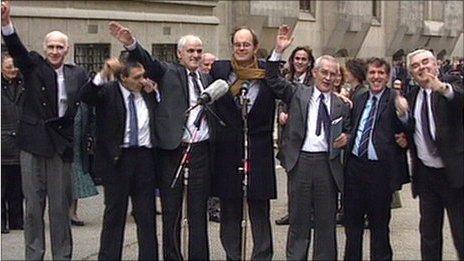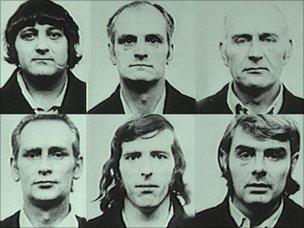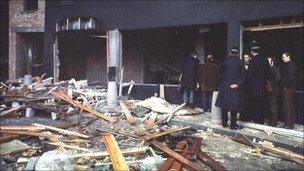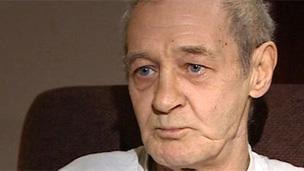Birmingham Six 'were in the wrong place at the wrong time'
- Published

Chris Mullin (centre) said the release of the Birmingham Six was one of the best days of his life
Twenty years ago the Birmingham Six were freed after their convictions for the murders of 21 people in two pub bombings were quashed.
They had served nearly 17 years behind bars in one of the worst miscarriages of justice seen in Britain.
Paddy Hill, Gerry Hunter, Johnny Walker, Hugh Callaghan, Richard McIlkenny and Billy Power strode from London's Old Bailey on 14 March 1991, their innocence finally proved.
Alongside the men as they left court greeted by cheering crowds and beeping car horns was Chris Mullin, a journalist and MP who had been working towards their freedom since the late 1970s.
Mr Mullin, now 63, first became interested in the case when his journalist friend Peter Chippindale, who attended the men's trial and that of the Guildford Four, told him "he thought they'd got the wrong men in both cases".
Later, Mr Mullin, a law graduate, came across a pamphlet by two Irish priests which presented the six men's version of events.
Shortly afterwards Paddy Hill wrote to Mr Mullin from prison detailing his innocence. It was one of hundreds of letters Mr Hill penned to people he thought could help him.
'Wrong pubs'
The six men were from Northern Ireland and had lived in Birmingham since the 1960s.
Five of them had left Birmingham New Street train station for Belfast on 21 November 1974, the night the Tavern in the Town and Mulberry Bush pubs were bombed.

Five of the men were arrested at Heysham ferry port
They were travelling to Belfast to attend the funeral of James McDade, an IRA member who had blown himself up planting a bomb in Coventry.
The men, some who had been childhood friends with McDade, were arrested in Heysham, Lancashire, as they waited for the ferry to Northern Ireland.
Mr Mullin's involvement in the case deepened with his passion to prove the men's innocence.
"I was convinced that here were six civilians who were in the wrong place at the wrong time," he said.
"They drank in the wrong pubs and clubs - while two of them worked with a man who was a genuine member of the IRA."
Mr Mullin became a researcher for ITV's World in Action in 1985 and aimed to "see if we could unearth new evidence" in the case.
The investigative current affairs programme, made by Granada TV, dedicated several editions to discrediting the evidence on which the six men had been convicted.
Mr Mullin said the main planks of evidence were "confessions" by four of the men and forensic evidence which their trial had heard was "99% accurate" in showing two had handled explosives.
Test doubts
Expert witness Frank Skuse said Mr Hill and Mr Power had tested positive for nitroglycerine in Greiss tests - chemical analysis looking for the presence of organic nitrate compounds.
Other scientists had argued the test was unreliable because a positive result could be gained from nitrocellulose in a range of innocent products.
In the autumn of 1985, World in Action demonstrated how shuffling an old pack of playing cards containing the substance produced a positive Greiss test. The accused men had played cards on their train journey.
Mr Mullin said a breakthrough came when an ex-police constable got in touch and "confirmed many of the violent tactics" the six claimed were used by the now defunct West Midlands Serious Crime Squad to secure confessions.
Mr Mullin said the alleged tactics included bringing dogs and shot guns into the cells and "conducting mock executions".
The ex-officer was interviewed on World in Action in 1986.
In the same year, Mr Mullin published a book, Error of Judgement: The Truth about the Birmingham bombings, in which he claimed to have traced and met some of those actually responsible for the bombings.

The bombings happened while many people were out drinking in the city
As demands for the case to be re-examined grew in Britain and Ireland, it was referred back to the Court of Appeal by the then home secretary Douglas Hurd. But the convictions were upheld in 1988.
It took three more years of articles, books and documentaries by a growing number of campaigners before the men's convictions were again re-considered.
Mr Mullin said the day the men were released was among the best of his life.
"It was a very exciting moment," he said. "It came a bit quicker than we anticipated. The Crown had abandoned the forensic evidence and confessions and was trying to upgrade the circumstantial evidence.
"And we had expected Michael Mansfield [defence lawyer] to continue his submissions but he said it was all 'nonsense' and sat down. At which point the judge quashed the convictions and the men were propelled outside to cheering crowds, cameras and helicopters flying overhead."
Mr Mullin was with the men as they were driven in a convoy of cars to a party put on by the Catholic Chaplaincy in Hampstead.
Mr Mullin, who was the Labour MP for Sunderland South for 23 years, said he had received a lot of criticism for backing the case and still has the Sun's front page declaring "Loony MP Backs Bomb Gang" on his office wall.
"So it was very good to be publicly vindicated so spectacularly," he said.
The men's release was a day of celebration for some but for many of those involved in the Birmingham bombings and the aftermath the scars will always remain.
The families and friends of the 21 people killed, and the many who were terribly injured, have never seen justice done.
The IRA is believed to have carried out the bombings but no-one has ever admitted responsibility.
'Public outcry'
West Midlands Police said there were no plans to reopen the inquiry into the pub bombings but "it would look at any fresh information that came to light".

Paddy Hill helped set up a group to help other victims of miscarriages of justice
Mr Mullin said a miscarriage of justice such as the Birmingham Six case was "not likely" to happen now.
Interviews in police custody have to be recorded, a result of the Police and Criminal Evidence Act 1984.
And the Royal Commission, set up after the Birmingham case, established the Criminal Cases Review Commission.
One of the Birmingham Six, Richard McIlkenny, died in 2006, aged 72.
In 2010, Mr Hill, who co-founded the Miscarriages of Justice Organisation (Mojo), won his fight to get trauma counselling on the NHS.
He told the BBC's Hardtalk programme last month he still found it very difficult that none of the police officers he alleges played a part in his imprisonment has been prosecuted.
He said he told those looking for justice it would come from the most unexpected sources.
Mr Hill added: "The one thing about the British public - when they see an injustice they are not afraid to stand up and scream about it - and thank God.
"We were put into prison just to satisfy and to quell the public outcry and in the end it was the public outcry that got us back out again."